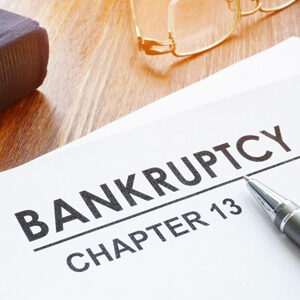How Does A Chapter 13 Bankruptcy Differ From A Chapter 7 And When Is Chapter 13 Preferred To A Chapter 7?

A Chapter 7 bankruptcy is when a debtor doesn’t have the ability to pay their debt back.
We help the debtor to figure out which chapter of bankruptcy is appropriate for them.
How Does Chapter 13 Compare With A Private Debt Consolidation Service?
Creditors aren’t required to participate in a private debt consolidation service. In Chapter 13 bankruptcy, the court has jurisdiction over all the parties, which includes the creditors. This means the creditors must comply with the reorganization process in a Chapter 13 bankruptcy case.
What Debts Are Not Released By Chapter 13 Discharge?
Typically, the same debts that are discharged in a Chapter 7 discharge are also discharged in a Chapter 13. Debts that are non-dischargeable are those acquired through…
- Fraud,
- Willful and malicious injury,
- Child support,
- Alimony, and
- Certain taxes.
Must All Debts Be Completely Paid Off Under A Chapter 13 Plan?
No, it isn’t required that all debt is paid off under a Chapter 13 plan. All or some of the debt needs to be paid back in a Chapter 13 bankruptcy. The debt that isn’t paid back is discharged.
Must All Unsecured Debts Be Treated Alike Under A Chapter 13 Plan, Or Can More Be Paid On Some Than On Others?
Typically, all unsecured debts have to be treated alike under a Chapter 13 plan.
Is It Necessary For All Creditors To Approve A Chapter 13 Plan?
It’s not necessary for any creditors to approve a Chapter 13 plan. The court will look at the proposed plan and determine if that plan meets the requirements of the law. All creditors must comply with the decision of the court.
Should A Husband And Wife Jointly File Under Chapter 13?
We don’t recommend that spouses file jointly under Chapter 13 bankruptcy unless both spouses have debt that needs to go into bankruptcy. If one spouse doesn’t have debt, they shouldn’t file jointly with their spouse.
May A Self-Employed Person File Under Chapter 13?
Yes, a self-employed person may file under Chapter 13 of the Bankruptcy Code.
Do You Get More Cases Of Self-Employed People Than Others?
You only really remember the cases that are a real pain in the neck, but I would say we actually see less self-employed people than others.
May A Chapter 7 Case That Is Still Open Be Converted To Chapter 13?
Yes, an open Chapter 7 case can be converted into a Chapter 13 case. There may be some strategic reasons to make that choice, but there are also other options available to clients. It depends on what you’re trying to accomplish.
How Does Filing Under Chapter 13 Affect Lawsuits And Judgments Against The Debtor?
Filing a Chapter 13 case stops all pending lawsuits and prevents anybody from collecting on judgments. Judgments become liens against real estate in the state of Iowa and we can get those liens removed in a Chapter 13 case.
When Does The Debtor Have To Appear In Court For A Chapter 13 Case?
Technically, the debtor never has to appear in court in a Chapter 13 case. They only need to appear at a 341 meeting, which is also known as a meeting of creditors. This meeting takes place about 30 to 45 days after you file for bankruptcy. The hearing is done telephonically in Iowa and the hearing itself takes approximately 5 to 8 minutes.
What Is The Role Of A Debtor’s Attorney In A Chapter 13 Case?
At Marks Law Firm, our role is to make the entire process easy for our clients. A high-level overview of what we do would include…
- Preparing the petition,
- Filing the petition with the clerk of court,
- Working directly with the trustee and the court to ensure that everything is administered properly,
- Setting up a Chapter 13 plan that will accomplish what the debtor desires without creating an undue hardship on them, and
- Providing support for the full 3 to 5 years it takes for your Chapter 13 case to complete.
For more information on The Need For A Chapter 13 Bankruptcy, an initial consultation is your next best step.
I Offer Free Phone Consultations
(515) 276-7211